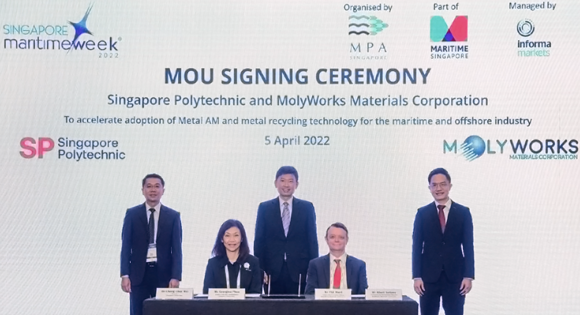MolyWorks partners with Singapore Polytechnic to advance metal AM in maritime and offshore industries
April 7, 2022

MolyWorks Materials Corporation, Los Gatos, California, USA, and Singapore Polytechnic have signed a Memorandum of Understanding (MOU) that aims to accelerate the adoption of metal Additive Manufacturing and metal recycling technology for the maritime and offshore industry. The collaboration will also aim to digitally transform the supply chain and drive sustainability within the sector.
The signing ceremony took place at the MarineTech Exhibition, held in conjunction with the Singapore Maritime Week (SMW) 2022, and was witnessed by Senior Minister of State for Transport Chee Hong Tat.
The MoU will see both parties enter collaborative efforts for the following:
- Advocating industry best practices in AM of ship components and spare parts for digital inventory and innovations in materials recycling to improve sustainability in the maritime and offshore industry
- Developing new metal alloys and AM processes to expand the range of materials suitable for the maritime and offshore industry
- Building a shared database for AM data and knowledge
- Training the industry workforce to ensure that the professionals in the maritime and offshore sectors are equipped with the right mix of skills, knowledge and competencies to adopt and implement AM.
Both parties will reportedly engage more than thirty local maritime and offshore companies to initiate joint industry and R&D projects and recruit over ten students to be part of the growing deep tech startup ecosystem in Singapore.
Georgina Phua, Deputy Principal (Development), Singapore Polytechnic, stated, “Additive Manufacturing is a promising technology that creates opportunities in driving sustainability and transforming sustainable business practices in the maritime and offshore sector. This is an excellent collaboration where Singapore Polytechnic‘s Innovation Centre for Additive Manufacturing will contribute and share its expertise and facilities to accelerate the design maturity and adoption of Additive Manufacturing in Singapore.”
“We share a common vision with our industry partners to harness the potential of this emerging technology to foster innovation in metal materials development and recycling, and reduce the costs in new materials production and digital inventory management,” Phua continued. “As part of our sustainability education efforts, we are committed to equipping our industry professionals and young learners with the knowledge, competencies and values to apply this technology to make a greater sustainability development impact for the maritime and offshore businesses.”
Phil Ward, Global Chief Executive Officer, MolyWorks Materials Corporation, commented, “Molyworks is very pleased to partner with Singapore Polytechnic, jointly applying our expertise to accelerate Additive Manufacturing capabilities for the maritime industry by enabling the use of green, low carbon, sustainable metal alloys. Our expansion into Singapore brings local production of existing and new alloys, further enhancing the capabilities of the local AM ecosystem for the maritime sector which has been developed over recent years with the help of MPA, NAMIC, SSA and other stakeholders. We are very much looking forward to enabling the cyclic economy for metals in Singapore.”
Kenneth Lim, Assistant Chief Executive (Industry), Maritime Port Authority of Singapore (MPA), added, “MPA welcomes the partnership between Singapore Polytechnic and Molyworks as their collaboration will complement Maritime Singapore’s efforts to promote greener materials for AM supply chain and supports upskilling of talents and capabilities. Singapore’s maritime industry has been an early pioneer in Additive Manufacturing (AM) technology for ships and port technologies. Through these past three years of joint industry programmes, the Maritime and Port Authority of Singapore, together with the National Additive Manufacturing Innovation Cluster and the Singapore Shipping Association, has catalysed a growing community of maritime users, service providers and technology developers for AM.”
















